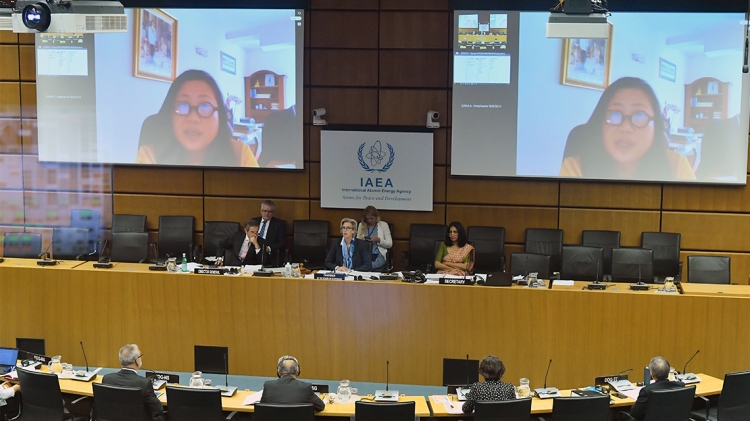The IAEA has carried out its largest ever operation by delivering 319 consignments of equipment for COVID-19 detection and diagnosis, personal protective equipment and other supplies to 88 countries, while continuing its normal operations during the coronavirus pandemic, Director General Rafael Mariano Grossi said today. Shipments of material have been delayed to some other countries due to transport restrictions.
Addressing the first virtual meeting of the IAEA’s Board of Governors, Mr Grossi said the Agency had adjusted well to the lockdown introduced in March, when almost all staff began working from home, and it had continued to implement safeguards throughout the world to prevent misuse of nuclear material and activities for non-peaceful purposes.
“When 121 countries turned to the Agency for assistance with the virus, we delivered,” Mr Grossi said in a prepared statement. “We remain very conscious of the difficulties many Member States face and fighting the coronavirus will remain our top priority until the pandemic is finally defeated.”
Despite the lockdown, the IAEA continued to carry out all of its most time-critical in-field nuclear verification work, while rescheduling some less urgent activities such as equipment installation and maintenance. “Delivery of most safeguards activities at headquarters and at regional offices continued,” Mr Grossi stated. “We maintained our verification and monitoring activities, including by chartering aircraft for inspectors for the first time in the history of the Agency.”
IAEA staff conducted many pandemic-related activities, including webinars to support thousands of human health specialists in 125 countries, webinars for veterinary experts through the VETLAB network, the evaluation of the efficacy of radiation for sterilising used respiratory masks of hospital staff and assistance to ensure the safety of relief food distributed to those made vulnerable during the lockdown in Uganda.
The Agency launched the COVID-19 Operational Experience Network, which enabled nuclear power plant operators and related organizations to share information on the impact of the pandemic. “Reports from operators and regulators indicate that safety and security are being maintained at nuclear power plants around the world,” Mr Grossi highlighted. “No country has reported the enforced shutdown of a nuclear power reactor due to the effects of COVID-19 on the workforce or supply chains.”
The IAEA’s Incident and Emergency Centre remained fully operational during the lockdown period.
Mr Grossi announced the launch of the Zoonotic Disease Integrated Action (ZODIAC) project – a global initiative using nuclear and nuclear-derived techniques to help countries to control diseases that cross from animals to humans, and to respond quickly to any outbreaks.
He noted that the coronavirus pandemic had exposed problems such as insufficient capabilities in many countries to detect viruses and other threats to human health, inadequate equipment in laboratories in many developing countries and poor communication between health institutions throughout the world.
The ZODIAC project will establish a global network of national diagnostic laboratories that can conduct coordinated monitoring, surveillance, early detection and control of emerging and re-emerging zoonotic diseases, using nuclear or nuclear-derived techniques. Member States will have access to equipment, technology packages, expertise, guidance and training. “With national laboratories connected to a regional network, and regional networks linked through a global platform, decision-makers will receive up-to-date, user-friendly information that will enable them to act quickly,” Mr Grossi stated. Read more about this initiative in this press release.





